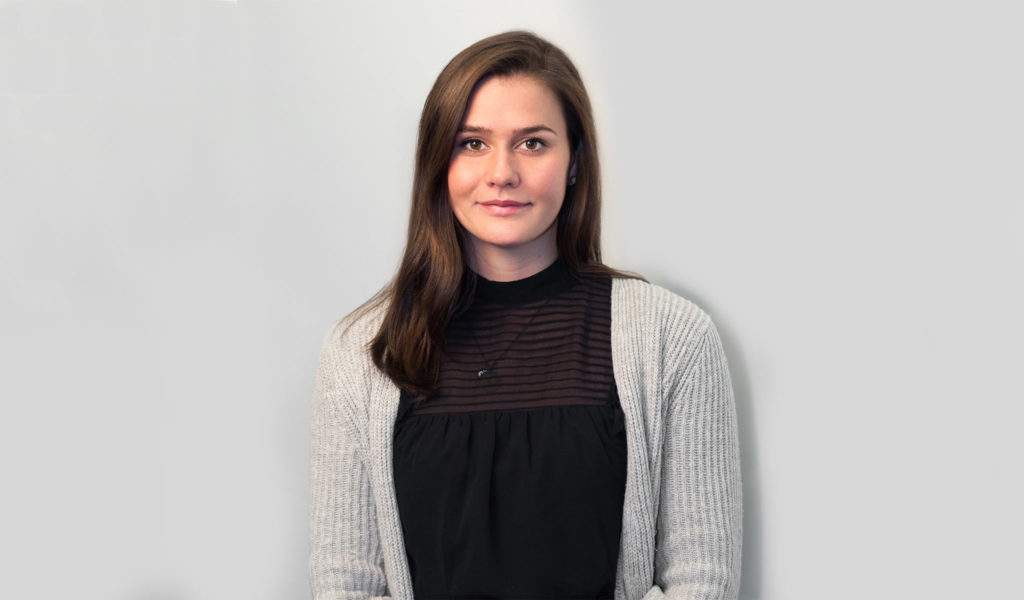Organizations are focusing more than ever on the environmental impact of their business. RTS Sustainability Brand Manager is familiar with this as she has worked with many of RTS’s clients in helping them implementing programs to reduce their waste. We sat down with her to learn more about her role and steps she thinks anyone can take to participate in the circular economy.
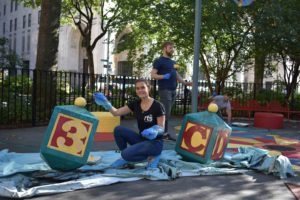
Q: Tell us about yourself and your current role.
I am a Sustainability Brand Manager at RTS (Recycle Track Systems). In the past few years, my focus has primarily been on developing and implementing waste diversion programs for premier clients, which includes everything from waste metrics reporting, ensuring clients meet compliance with local legislation, and managing donation programs. More recently, I have been working on expanding the company’s consumer footprint with the recent launch of zerowaste.com – a lifestyle portal offering individuals and businesses informative content, tips, zero waste products, and educational guides to break down what zero waste means and the steps anyone can take to reduce waste.
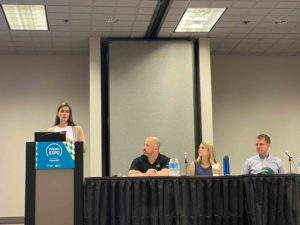
Q: What does a sustainable future look like to you?
I think a sustainable future is one that embraces a circular economy meaning smarter design, less waste, and better infrastructure to manage materials to keep them in the loop. I also believe to get there we need action at the top, meaning policy and legislation in place to ensure corporations are responsible for the impact their business operations have on environmental and human health. I think a lot of consumers are doing their part to reduce their own personal impact on our planet through their consumption habits and I think that shift is causing businesses to react and make more responsible business decisions, but there is definitely more to be done from the top.
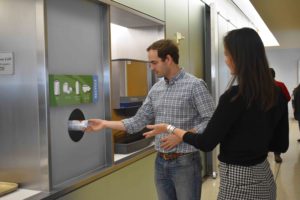
Q: One of your biggest focuses right now is on diverting food waste that cannot be donated. How does RTS help clients to ensure food waste remains out of landfill?
As you mentioned, much of our focus is on what to do with waste after it is produced but we first urge and work with our customers to focus on food waste reduction and help them implement food waste donation programs. The next step would be to set up an organics recycling program for our clients. It’s important to understand how much food waste you are actually producing so can set up an efficient program and also track against the waste generated over time. Once we know how much food waste a client is producing, it’s important to make sure they have the appropriate materials for their program including equipment and educational signage. Education is key to any organics or recycling program for that matter. Training employees and staff members that are actually producing the waste on what is allowed or not allowed in the organics recycling program is so important to ensure this waste remains clear of contaminants like plastic or glass so that it can be accepted at the end destination facility. Cities that have rolled out food waste recycling legislation, like New York, have been incredibly effective in getting large commercial food waste generators to separate waste from trash and it makes a huge difference.
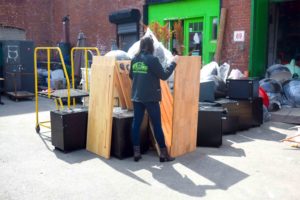
Q: You’ve worked with a wide variety of clients to help them meet their sustainability goals, including premium hotels, stadiums, and Fortune 500 companies. What are some of the most exciting projects you’ve worked on?
Working with Citi Field during the NHL Winter Classic game in 2018 was definitely one of my favorite projects to be a part of. We were the first waste provider in NHL history to donate the entire hockey rink, which was incredible. We donated 18,000 square feet of wood used to construct the hockey rink to the Department of Sanitation of NY with the help of Material for the Arts. They used the wood to help repair some of their facilities throughout New York. We also work a lot with Barclays Center over the years to donate their furniture from the stadium as well as helped them divert materials like carpet, employee uniforms, and fans’ confiscated cigarette lighters from landfill. It’s always exciting and inspiring to be part of those donation and reuse projects.

Source: shop.zerowaste.com
Q: You’re also been instrumental in developing zerowaste.com, a lifestyle portal which helps consumers reduce their waste footprint in their daily lives. What are some of the important steps you are taking to help people understand what products they’re buying and how they can make a difference?
We spend a lot of time researching and testing out the brands and products that we feature on zerowaste.com to make sure they are sustainable, work well, and are truly making a difference in replacing wasteful items. Our hope is that we are exposing consumers to sustainable products they have never used, considered using, or even knew existed and give them the confidence to work them into their everyday routines. I also think it’s overwhelming to hear about and witness the damage being done to our planet and fellow humans all around us and it can be comforting to have control over your own personal impact and consumption habits. We hope we can help individuals along their personal journey by giving them the resources they need to reduce their impact on the environment through incremental changes in consumer behavior. We may not see it immediately but our choices as consumers are noticed by companies who will make positive changes to their business practices in response to consumer behavior. I think there is power in collective individual actions.
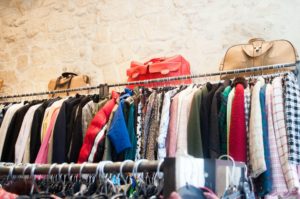
Q: What are some of the easiest fixes you’ve implemented at home and in your life to reduce your footprint that other people can replicate?
I know everyone’s lives and circumstances are different across the board but this is what has worked for me in my life to reduce my personal footprint. I’d say the biggest change I have made in my life to reduce my carbon footprint is cutting out meat from my diet. Meat is resource-intensive to grow animal feed, raise livestock for meat, etc. So cutting it from your diet can be impactful in reducing your personal carbon footprint. Thrifting is another way I’ve reduced my footprint. Going to local thrift stores is a lot of fun to search for clothing or homeware, you can always find something unique that you’ll love and it’s typically cheaper than buying new. Some of my favorite products that have helped me cut waste in my daily life include reusable food wraps, a reusable razor, deodorant cream in a jar, and menstrual cups. Reusable food wraps have helped me eliminate disposable aluminum foil from my home. Thanks to my reusable razor and menstrual cup, I stopped buying plastic disposable razors and disposal menstrual items which helps me cut back on my single-use plastic consumption and also saves me a lot of money. My favorite is my deodorant cream that comes in a glass jar. I don’t purchase deodorant in plastic tubes anymore and I reuse the glass jars for storing salad dressings or for carrying jewelry when traveling.
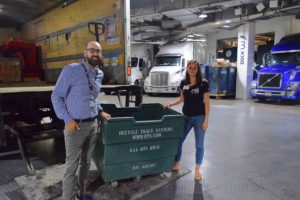
Q: As the world starts to emerge from the COVID-19 pandemic, what do you think the next 12 months holds in store for sustainability and environmental initiatives? What are you most excited about?
Companies are taking a closer look at their environmental impact these days. As younger generations begin to enter the workforce, they are looking to work for companies that have sustainable practices and initiatives in place. I also think this pandemic has proven employees can work efficiently from a remote environment and think we’ll see a lot of companies continue this trend which will help reduce environmental impacts associated with employee transportation and emissions from buildings, etc. I also think the pandemic has given a lot of people a deeper appreciation for our environment and a deeper understanding of how our actions impact the environment. With travel significantly reduced and people working from home, there has been a reduction in recorded pollution levels. I hope we keep that in mind as a society post-pandemic.
Subscribe to rts.com today to learn about more innovative companies or chat with one of TRUE Advisors for information on how to take your business zero waste.
